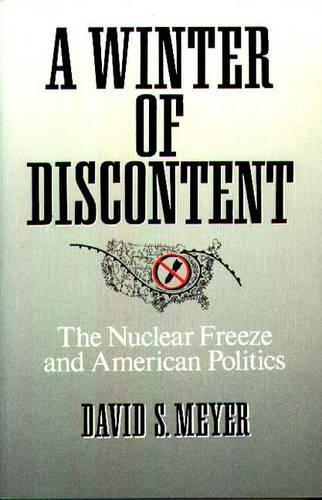
A Winter of Discontent: The Nuclear Freeze and American Politics
(Paperback)
Publishing Details
A Winter of Discontent: The Nuclear Freeze and American Politics
By (Author) David Meyer
Bloomsbury Publishing PLC
Praeger Publishers Inc
26th June 1990
United States
Classifications
Tertiary Education
Non Fiction
Arms negotiation and control
327.174
Physical Properties
Paperback
320
Width 156mm, Height 235mm
482g
Description
The nuclear freeze movement grew more quickly than even the most optimistic activists thought possible, as large numbers of Americans became convinced that there was something wrong with United States defense policy and that they could do something about it. This analysis provides the first comprehensive history of the nuclear freeze movement, approaching it from three distinct perspectives. Changes in the politics and policy of nuclear weapons created an opportunity for a dissident movement. Intermediating forces in American politics influenced the situation. The efforts of activists and organizations to build a protest movement and their interaction with American political institutions provide the third perspective. A Winter of Discontent addresses both the broad spectrum of movement activity and the political context surrounding it. The text explores the challenge of the nuclear freeze movement to the content of United States national security policy and the policy making process. By analyzing the freeze, a theoretical framework for understanding the origins, development and potential political influence of other protest movements in the United States can be developed. The book also strives to integrate analysis of peace movements into an understanding of the policy context in which they emerge. This volume is essential for courses in social movements, strategic policy, American politics and political sociology. Antinuclear freeze activists and students of peace studies will also find this work invaluable.
Reviews
"A rare achievement, combining impeccable scholarly research with lively, readable prose. . . . It is at the same time a careful, thoughtful history of the recent nuclear freeze movement, and a sophisticated analysis of the problem of social change in this country, using that movement a test. The synthesis of theory and history is accomplished with great skill, making the book valuable to students of social change and to a larger public."-Howard Zinn
"Meyer uses the rise and fall of the nuclear freeze movement to illuminate several important and subtle features of American politics. It is theoretically informed and analytic while at the same time rooted in detailed and concrete knowledge of the politics of the Freeze. . . . This book seems a likely candidate for use as a supplementary text in courses on social movements, public opinion and foreign policy, or, for that matter, in general courses on American politics."-William A. Gamson
"The nuclear freeze movement, despite demonstrating large margins of public support, was unable to translate its central demand into policy. With exceptional clarity and insight, David Meyer explains why. He shows how the freeze was stymied by an institutional obstacle course that confronts all protest movements in the United States, clarifying the dilemmas that peace activists continue to face. This is essential reading for anyone who wants to make sense of the freeze movement or make nuclear policy more responsive to democratic processes."-Pam Solo
The nuclear freeze movement grew more quickly than even the most optimistic activists thought possible. This analysis provides the first comprehensive history of the nuclear freeze movement, addressing both the broad spectrum of movement activity and the political context surrounding it.-The Washington Monthly
"The nuclear freeze movement grew more quickly than even the most optimistic activists thought possible. This analysis provides the first comprehensive history of the nuclear freeze movement, addressing both the broad spectrum of movement activity and the political context surrounding it."-The Washington Monthly
Author Bio
DAVID S. MEYER is Visiting Assistant Professor of Political Science at Tufts University. He was active as a local organizer in the nuclear freeze movement and has worked as a researcher at the Institute for Defense and Disarmament Studies.
